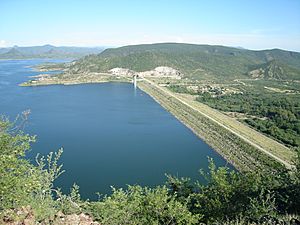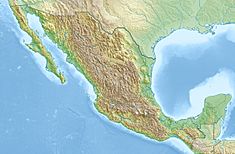Álvaro Obregón Dam facts for kids
Quick facts for kids Álvaro Obregón Dam |
|
|---|---|

Upstream side of dam in 2006
|
|
|
Location of Álvaro Obregón Dam in Mexico
|
|
| Official name | Presa Oviáchic |
| Country | Mexico |
| Location | Cajeme, Sonora |
| Coordinates | 27°49′21″N 109°53′34″W / 27.82250°N 109.89278°W |
| Status | In use |
| Construction began | 1947 |
| Opening date | 1952 |
| Dam and spillways | |
| Type of dam | Embankment |
| Impounds | Yaqui River |
| Height | 57 m (187 ft) |
| Length | 1,457 m (4,780 ft) |
| Reservoir | |
| Creates | Lake Oviáchic |
| Total capacity | 3,226,000,000 m3 (2,615,361 acre⋅ft) |
| Surface area | 208 km2 (80 sq mi) |
| Power station | |
| Operator(s) | Comisión Federal de Electricidad |
| Commission date | 28 August 1957 |
| Turbines | 2 |
| Installed capacity | 19 MW |
The Álvaro Obregón Dam, also called the Oviáchic Dam, is a large embankment dam located on the Yaqui River in Sonora, Mexico. It's built north of a city called Ciudad Obregón. This important dam helps with three main things: providing water for farms, stopping floods, and making hydroelectric power. It has a power station with two generators that can produce 19 megawatts of electricity.
Why the Dam Was Built
Dams like the Álvaro Obregón Dam were built in the 1940s and 1950s. This happened because of a big problem: drought. A drought is when there isn't enough rain for a long time. To help with this, dams were constructed on the Sonora and Mayo Rivers.
Building the Dam
Work on the Álvaro Obregón Dam started in 1947. It took five years to build, and the dam was finished in 1952. The part of the dam that makes electricity, called the power station, began working a few years later, in August 1957.
Dam Size and Purpose
The dam is quite large! It stands 57 m (187 ft) tall from the riverbed. It is also very long, stretching 1,457 m (4,780 ft) across the river.
The dam also has another smaller dam, called a saddle dam, about 2 km (1 mi) to its northwest. Together with a system of canals, the dam helps water a huge area of farmland. It irrigates about 83% of a 232,999 ha (900 sq mi) region. This means it brings water to crops so they can grow, even when there isn't much rain.
Water Challenges
Even with the dam, droughts can still cause problems. In the 1990s and 2000s, there were more droughts. Because of this, in 2004, for the first time, water from the dam's reservoir could not be used for irrigation. There simply wasn't enough water to share.
See also
 In Spanish: Presa Álvaro Obregón para niños
In Spanish: Presa Álvaro Obregón para niños
- List of power stations in Mexico
 | Anna J. Cooper |
 | Mary McLeod Bethune |
 | Lillie Mae Bradford |


